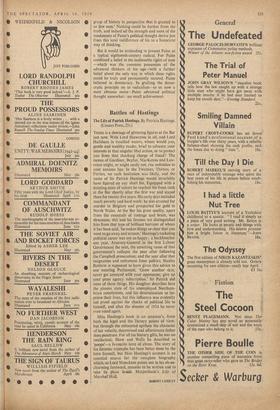Battles of Hastings
The Life of Patrick Hastings. By Patricia Hastings. (Cresset Press, 25s.) The Life of Patrick Hastings. By Patricia Hastings. (Cresset Press, 25s.) THERE is a shortage of glittering figures at the Bar just now. With Lord Shawcross in oil, and Lord Hailsham in troubled waters, whom would you, gentle and Wealthy reader, brief to advance your interests in that singular libel action, or to protect you from that shocking charge of fraud? The names of Gardiner, Beyfus, MacKenna and Law- rence might, or might easily not, rise unbidden to your anxious lips. In the Twenties, Thirties, or Forties, no such hesitation was likely, and the name of Sir Patrick Hastings would invariably have figured on any short list. Equipped with a dazzling store of talents he reached the front rank at the Bar shortly after the first war and stayed there for twenty-five years. His early days included much poverty and hard work; he was arrested for murder in Belgium and prospected for gold in North Wales. At the Bar his great quality, apart from the essentials of courage and brain, was directness; this and his famous wit distinguished him from that type of brilliant barrister of whom it has been said, 'he makes things so clear that you want to go away and scream.' Hastings's rocketing political career was not so happy : a backbencher one year, Attorney-General in the first Labour Government the next, the unwitting cause of that government's collapse the year after following the Campbell prosecution; and the year after that resignation and retirement from politics. Stanley Baldwin is supposed to have given this advice to one entering Parliament, 'Grow another skin; never get annoyed with your opponents; give up your press agency subscription.' Sir Patrick did none of these things. His daughter describes here the piteous state of his unemployed Northum- brian constituents, and his determination to im- prove their lives, but this influence was evidently not proof against the shocks of political life to himself, and after the disaster of 1924 he never even voted again.
Miss Hastings's book is an amateur's, from both the legal and the literary points of view; but through the exhausted epithets the character of her volatile, determined and affectionate father does penetrate. For all his literary gifts, he was no intellectual; Shaw and Wells he described as 'poops'—a favourite term of abuse. The story of his forensic triumphs has been better done by the hero himself, but Miss Hastings's account is an essential source for the complete biography which, as Lord Monckton points out in his oh-so- charming foreword, remains to be written and to take its place beside Marjoribank's Life of Marshall Hall.
ROBERT LINDLEY














































 Previous page
Previous page